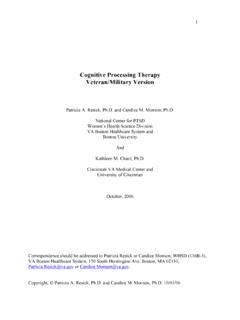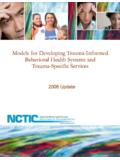Transcription of Occupational Therapy in Cognitive Rehabilitation - …
1 Occupational Therapy in Cognitive RehabilitationConnie MS LeeOccupational therapist Queen Mary HospitalHong KongPage 2 CognitionCognition refers to mental processes that include the abilities to concentrateconcentrate, rememberrememberand learnlearn, which enable us to think. Thus people with Cognitive deficits may have reduction in these 3 Occupational Therapy " Occupational Therapy is as a profession concerned with promoting health and well being through engagement in occupationoccupation." (World Federation of Occupational Therapists)Occupation is being described as purposeful and meaningful activities in which a person engage as part of his normal daily livesnormal daily aspects of living that contribute to health and fulfillment for an individual (McColl et al.)
2 , 2003) Page 4 Scholar develop and formulate theories Researcher study the disease, the knowledge acquired in clinical practicePage 5 Occupational Therapy in Cognitive Rehabilitation from a clinician on Cognitive function and brain structure responsible for a specific Cognitive of disease that may cause Cognitive of the mechanism of Cognitive , models and framework for of Cognitive impairment for Occupational of intervention approachesKnowledge on neuropsychology and medicineKnowledge of Occupational therapyPage 6(1) Knowledge on Cognitive function and brain structure responsible for a specific Cognitive functionCognitive subcomponent.
3 AlertnessAttentionConcentration, selective attention, attentional flexibilityOrientationTime, place, personMemoryLength of retention and recall, content relative to timeIntellectual processComparing, categorizing, determining relationship, concrete and abstract thinking, logical reasoning, intellectual flexibility, metacognition, insightProblem solvingProblem recognition, problem identification, problem and situation analysis, selection of a course of action, implementation of the action, execution of the solution chosen, evaluation of problem resolutionAn example of classification of Cognitive function:Page 7(1) Knowledge on Cognitive function and brain structureresponsible for a specific Cognitive functionPage 8 Why knowledge of cognition is important?
4 Understanding of the complex integrated and interrelating functions of multiple Cognitive and perceptual functions allows us:Executive function Planning, organization problem solving in cookingIncorrect sequence, overcook food, inability to manage multiple task in kitchenPage 9(2) Understanding of disease that may cause Cognitive impairment (examples given) induced Cognitive dysfunctionDrug induced Cognitive dysfunctionBenzodiazepines (tranquillizers & sleeping pills), opiates (narcotics), tricyclic antidepessants (TCAs),etc.
5 Are known to cause Cognitive impairment such as delirium, reduced concentration and 2. Electrolyte imbalanceElectrolyte imbalanceElectrolyte imbalancePossible signs and symptomsSodiumDelirium with symptoms include memory loss, attention deficit, alteration in sleep-wake cycles, hallucination and focusing, trouble maintaining conversation, mood swings, problems with following , inability to recite months backward, difficulty with repetitive tasks, disorganized thought processes, lethargy, reduced 10(3)
6 Understanding of the mechanism of Cognitive impairmentAnemia secondary to lack of erythropoietin production by the kidneys in patients with chronic kidney Vs Chronic disorderPage 11 Why understanding disease causing Cognitive dysfunctionis important?Page 12(4) Theories, models and framework for practice A framework is used to gather and organize information for designing effective intervention. A framework addresses the interrelationship of the personperson, occupationsoccupationswith the environmentenvironment, and contexts in which they occur.
7 International Classification of Functioning, Disability and Health (ICF) (WHO 2001)Page 13(4) Theories, models and framework for practiceOccupational Therapy Practice FrameworkClient factorsAreas of occupationPerformance contextPerformance skillsPerformance patternsActivity demandsAn Occupational Therapy specific framework for practicePage 14(4) Theories, models and framework for practiceAnalysis of impairments, activity limitations and participation restrictionsTheories and methods in the study of cognition and Cognitive impairmentAnalysis of occupations: tasks, activities and rolesFrameworks of Occupational Therapy (OTPF)Framework of health, function and disability (ICF)Identification of Occupational performance needs.
8 Assessment and intervention planningPage 15(4) Theories, models and framework for practiceICFOTPFBody functions & body structureClient factors: body functions & body structureActivities and participationAreas of occupation: ADL, IADL, education, work, play & leisure, and social participationEnvironmental factorsPerformance contexts: physical, social, temporal, virtual, spiritual and personalPersonal factorsPerformance skills: motor skills, process skills, communication/interaction skillsPerformance patterns: habits, routines, rolesActivity demands: Required action, sequence and timing, objects and their properties, space demands and social demandsPage 16 Why are frameworksimportant?
9 It helps us to identify in a systematic way how a change in Cognitive status impacts upon Occupational Analyze the characteristics and demands of any given Determine the individual s impairments, activity limitations and participation restrictions that need further investigation and 17(5) Implications of Cognitive impairment for Occupational performanceNeuropsychological assessment:examine how specific functions of the brain are working. for example, speed of thinking, sustaining concentration. Occupational Therapy Cognitive assessment:determining how Cognitive deficits can impact everyday activities Cognitive screening:Mini mental State Examination (MMSE)Neurobehavioral Cognitive State Examination (NCSE)Montreal Cognitive Assessment (MoCA) assessments:Test of Everyday Attention (TEA)Rivermead Behavioral Memory Test(RBMT)Behavioral Assessment for Dysexecutive Function (BADS)Behavioral Inattention Test (BIT).
10 Page 18(6) Choice of intervention approachesPopular approaches for guiding practice with patients who have Cognitive and perceptual information-processing approach and the quadraphonic dynamic interaction retraining neurofunctional Cognitive disability approachMore consistent and structure intervention program with specific rationale behindPage 19A community based Cognitive workshop the mildly impaired elderly attend the assessment session would be undergone scored above cut-off in MMSE would be further


